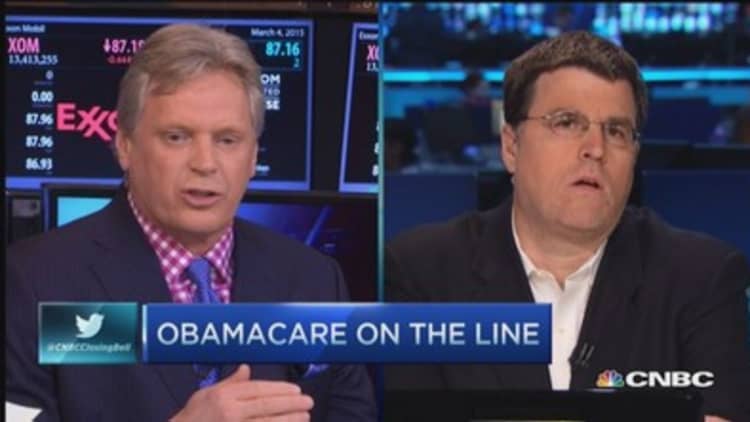Kristi Whitfield, owner of Curbside Cupcakes in Washington, D.C., is exactly who the Washington, D.C. Small Business Health Options Program, or SHOP, had in mind.
The entrepreneur has eight employees, and enrolled some staff and her family in insurance plans through the exchange, designed for small businesses with fewer than 50 employees. The move is saving her $300 a month, and will also qualify for a small-business tax credit under the Affordable Care Act.
Congress on the other hand, doesn't fall under SHOP's small-business qualifications. Yet 13,000 members and staffers have enrolled in subsidized insurance plans under the same small-business exchange Whitfield used.
How did this happen?
Read MoreRiding the ups and down of the small-business Obamacare market
Obamacare legislation calls on states to create two types of online insurance portals—one for individuals and families, and one for small businesses with fewer than 50 employees. But as an employer, Congress fits into neither bucket.
So the workaround was a rule issued in 2013 by the U.S. Office of Personnel Management—a federal agency—that directs congressional members to enroll in the health-care exchange that was set up for small businesses with 50 or fewer employees.
The move allowed members of Congress and their staff to keep the subsidized health care they've long received for being federal employees under the Federal Employee Health Benefits program. The House and Senate employ thousands, and the personnel management office essentially had issued a ruling that contradicted the Obamacare legislation.
It wasn't long before legal challenges related to the rule began to emerge, with some contending Congress is pocketing a subsidized health-care care perk not intended for them.

The latest charge is coming from Sen. David Vitter, R-La., chair of the Senate Small Business and Entrepreneurship Committee. Vitter's office says Congress employs nearly 16,000, and the rule needs to be undone, adding that subsidies cover about 70 percent of premiums for members of Congress.
"We are essentially hijacking what is meant to be an exchange for small business," Vitter said.
The Office of Personnel Management declined to comment.
Silver lining?
As the Obamacare challenge drags on, cupcake shop owner Whitfield says on the whole, all the back and forth misses the point. "It overshadows the good that the law has done for small businesses like mine," she said.
And in a weird twist of fate, more enrollees on the health exchange may mean a healthier risk pool for enrollees on the D.C. SHOP exchange, which could lower future costs for all consumers including entrepreneurs and congressional members.
Gary Burtless, senior economic fellow at the Brookings Institution, says it's important to remember that while congressional leaders are well-paid, staffers aren't earning hundreds of thousands of dollars a year.
"If you're a millionaire, you're not worried about who is paying for your health care," Burtless said. "Congressmen may be making a lot of money, but that's not true of their staffs, and while this is a rather terrible scheme, it may actually reduce the risk of the general enrollment pool."


